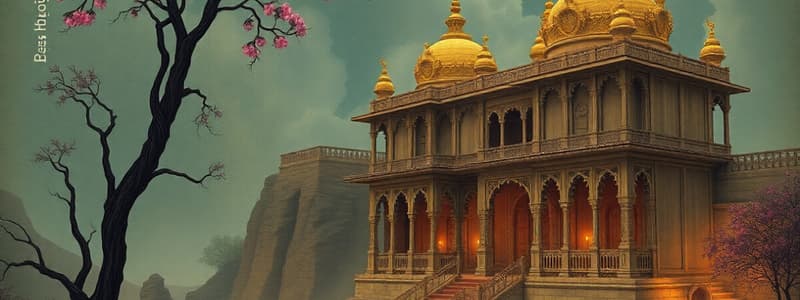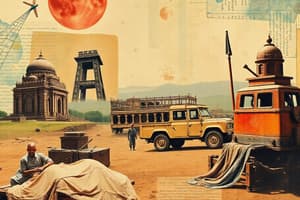Podcast
Questions and Answers
What is notable about the archaeological site of Mohenjodaro?
What is notable about the archaeological site of Mohenjodaro?
- It includes the Great Bath, the largest building of the civilization. (correct)
- It is characterized by a lack of systematic town planning.
- It features a unique water harnessing system.
- It contains the only known remains of a horse.
Which of the following sites is known for having a dockyard?
Which of the following sites is known for having a dockyard?
- Chanhudaro
- Harappa
- Dholavira
- Lothal (correct)
Which feature is common across major Indus Valley cities?
Which feature is common across major Indus Valley cities?
- Circular town planning layout
- Use of iron in construction
- Absence of fortified citadels
- Underground drainage systems (correct)
What was a significant find at the site of Harappa?
What was a significant find at the site of Harappa?
What distinguishes the archaeological site of Dholavira from other sites?
What distinguishes the archaeological site of Dholavira from other sites?
Which archaeological site is associated with the largest known Harappan inscription?
Which archaeological site is associated with the largest known Harappan inscription?
What type of burial practice was observed at Lothal?
What type of burial practice was observed at Lothal?
Which site is characterized by its lack of fortification?
Which site is characterized by its lack of fortification?
Flashcards are hidden until you start studying
Study Notes
Harappa
- Six granaries in a row, working floors, and workmen's quarters were discovered.
- Evidence of a Virgin-Goddess (seal), cemetery, stone symbols of Lingam (male sex organ) and Yoni (female sex organ).
- Painted pottery, clay figures of Mother Goddess, wheat, barley in wooden mortar, copper scale, crucible for bronze, copper-made mirror, vanity box, dice.
Mohenjodaro
- The Great Granary and the Great Bath, the largest building of the civilization, were found.
- Evidence of an Assembly Hall, shell strips, Pashupati Mahadeva/Proto-Shiva (seal), bronze image of a nude woman dancer, steatite image of a bearded man, human skeletons huddled together, painted seal (Demi-God), clay figures of Mother Goddess, fragment of woven cotton, brick kilns, 2 Mesopotamian seals, 1398 seals (56% of total seals of the civilization), dice.
Chanhudaro
- Unique in that it lacked a citadel, and instead had evidence of an inkpot and lipstick.
- Evidence of metal-workers, shell-ornament makers, and bead-makers' shops.
- Imprint of a dog's paw on a brick, terracotta model of a bullock cart, bronze toy cart.
Lothal
- Notable for its dockyard and rice husk discovery.
- Evidence of metal-workers, shell-ornament makers, fire altars, terracotta figurine of a horse, double burial (burying a male and a female in a single grave), terracotta model of a ship, dying vat, Persian/Iranian seal, Bahrainean seal, painted jar (bird and fox).
Kalibanga
- The site features a ploughed field surface (Pre-Harappan).
- Evidence of 7 Fire altars, decorated bricks, wheels of a toy cart, Mesopotamian cylindrical seal.
Banawali
- Unusual in its lack of a chess-board or gridiron pattern town planning.
- It also had no systematic drainage system.
- Evidence of a toy plough, clay figures of Mother Goddess.
Dholavira
- Known for its unique water harnessing system and its storm water drainage system, a large well, a bath, and giant water reservoirs.
- The only Indus site that was divided into 3 parts, and it had a stadium, as well as the largest Harappan inscription, used for civic purposes.
Surkotada
- Located in Kutchh district, Gujarat, it is the only Indus site where the remains of a horse have been found.
- Evidence of oval graves and pot burials.
Daimabad
- Evidence of Bronze images (Charioteer with chariot, ox, elephant, and rhinoceros).
Mohenjo-daro and Rakhigarhi
- Mohenjodaro is the largest site of the Indus Civilization.
- Rakhigarhi is the Indian site with the largest excavated area.
Common Features of Major Cities
- Systematic town planning using a grid system.
- Use of burnt bricks in construction.
- Underground drainage systems, including giant water reservoirs in Dholavira.
- Fortified citadel, with the exception of Chanhudaro.
Studying That Suits You
Use AI to generate personalized quizzes and flashcards to suit your learning preferences.




